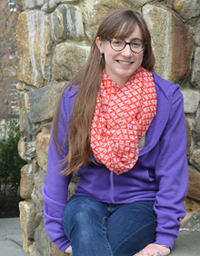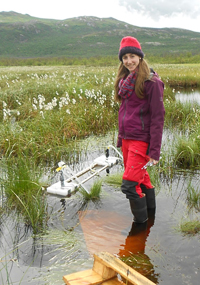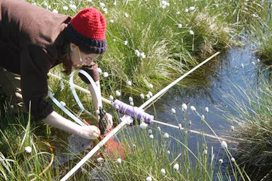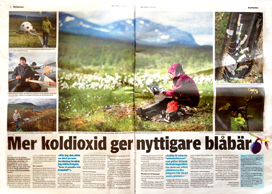May 5, 2014
Sophie Burke, NERU 2012 Student,
Awarded Fulbright U.S. Student Award
SOPHIE BURKE, 2013 UNH graduate with a B.S. in Environmental Sciences, is about to begin her NRESS (Natural Resources and the Environment) Ph.D. program this fall; then, in January 2015 she will spend 10 months in New Zealand, studying and doing scientific research funded by a Fulbright U.S. Student Award.
She credits the NERU program, along with her many other UNH research experiences, with preparing her for this New Zealand research project. Says Sophie, "NERU was amazing. The program totally made me fall in love with international research."
Her love of research had a very humble beginning — a 1-credit "Professional Perspectives in Environmental Science" course that she took in her freshman year at UNH. Among the class guest lecturers were Linda Kalnejais (UNH Asst. Prof., Oceanography) and Ruth Varner (Assoc. Professor, Biogeochemistry). At the close of one lecture, Sophie asked Dr. Kalnejais if she could use any help in her lab. And with that, a first research experience launched a career path.
As Sophie tells it, she was immediately treated as a colleague. That attitude boosted her interest in research and her enthusiasm for lab work. She worked on an acid mine drainage project, using a bubbling system to extract ammonium from low-level ph samples. In helping to build the bubbling devices, Sophie discoverd that she likes "making things."
During the summer of 2011, she joing a Research Experience for Undergraduates as part of the Plum Island Ecosystem Long-Term Ecological Research Network under the direction of Dr. Wil Wolheim (Asst. Prof., Water Systems Analysis). She assisted a Ph.D. candidate doing solute addition experiments—part of a study on the biogeochemical impacts of suburbanization on the Ipswich Watershed in Massachusetts.
In Spring 2012, Sophie opted for a "study abroad" semester, traveling to New Zealand as part of the UNH EcoQuest program. During that EcoQuest experience, she visited the site where she will now do her Fulbright work.
Sophie also applied for a NERU internship through the UNH Hamel Center for Undergraduate Research—her first experience in grant proposal writing. That NERU program, directed by Dr. Varner, took her to Abisko, Sweden during summer 2012. After her May 2013 graduation, she returned to Sweden, funded by a National Science Foundation MacroSystems Biology grant, working as a research assistant with the newest class of NERU students—for most of them, their first research experience.
She will return to Sweden this summer as a research technician, funded with a Malmberg Scholarship from the American Swedish Institute. During her 4 months in Sweden, she will help the NERU 2014 students, but will also collect her own project data until September, which will provide a longer series of research measurements. Her research: Measuring Methane (CH4) from thaw ponds, using a more sophisticated version of that early bubbling system to quantify the release of methane. She will also have bubble traps deployed in peat, and in a nearby lake, measuring methane flux for comparison purposes.
In 2012 and 2013 she presented her research at the fall meetings of the American Geophysical Union (AGU), an international scientific society of over 35,000 members. At the meeting Sophie was introduced to Dr. David Campbell, Sr. Lecturer at University of Waikato, Hamilton, New Zealand. Further discussions led her to apply for a Fulbright Award, with Dr. Campbell as her mentor.
While in New Zealand, she will assess how peat quality impacts the sensitivity of methanogens (methane producing microorganisms) to drought. This will be done by measuring Methane and CO2 fluxes in two vastly different peatlands in the North Island. The first peatland is in a relatively undisturbed area; the second is in an area subject to flood control regimens, which affects the quality of peat by introducing sediment, seeds, plants, and human intervention. A nearby flux tower will provide an additional set of atmospheric chemistry measurements.
In looking back at her UNH undergraduate experience, she credits much of her continued research interest to her mentors. "They encouraged me, never let me feel my own inexperience, and wanted to hear my ideas. They helped me to be more comfortable presenting at research conferences."
What makes a good mentor? "Attitude is huge. The best mentors are very willing to teach and help, yet allow students to bring their own ideas and perspectives to the table." Her goal: to continue with research and to teach at a University level.



